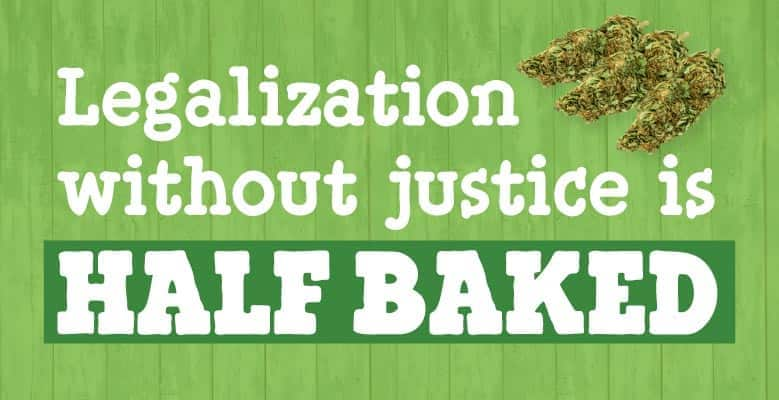
Take Action Today!
Tell your governor legalization without justice is HALF BAKED.

Now that cannabis is legal for recreational use in 21 states and medical use in 38, it’s a pretty heady moment for stoner culture. Fans of cannabis can enjoy 4/20 openly in more parts of the country than ever before. And even if you’re not in a state that has legalized, there’s still a pretty good chance that you can spend 4/20 doing your thing without having to worry about being arrested...
If you’re a white person.
That’s the harsh reality. If you love cannabis AND you’re white, everything is totally awesome these days. It’s fun—and lucrative: In 2022, 88% of executives at cannabis companies were white, and only 12% were people of color. Meanwhile, even in states where cannabis is legal, and even though Black people and white people partake at similar rates, Black people are still arrested way more often. We love 4/20 and we love legalization, but we don't love systematic racism, and that's exactly what this is.

Tell your governor legalization without justice is HALF BAKED.
True, cannabis is still illegal on the federal level but, as more and more states say yes to legalization, that hasn’t stopped the cannabis industry from booming—cannabis sales hit a record high of $25 billion in 2021.
That kind of money has the power to change minds. Take former Speaker of the House John Boehner. Once “unalterably opposed” to legalizing cannabis, he’s now a full-time supporter (and investor). To be fair, the country as a whole has shifted its perspective on legalization over the years, with more than two-thirds of the public now in favor (including majorities of Democrats and Republicans).
No doubt about it, that’s good news for those in support of legalization.
The bad news is that the criminal justice system hasn’t kept up with the cultural shift. Even Boehner’s change of heart only goes so far. Regarding the 400,000 people arrested for selling or trafficking pot during his time as Speaker (2011-2015), he said, “The whole criminal justice part of this, frankly, it never crossed my mind."
That’s a problem! White people are making a lot of money by selling cannabis (Black entrepreneurs are so far being shut out of the boom), and Black people are getting arrested for using it.
Between 2001 and 2010, before the recent rapid rise in the number of states legalizing cannabis, there were more than 8 million cannabis arrests (88% for possession) across the US. According to a 2020 report from the ACLU, there were more than 6.1 million cannabis arrests (90% for possession) between 2010 and 2018. Cannabis arrests have fallen by more than half from their peak in 2008, but even so, there were still about 350,150 arrests in 2020 (91% of them for possession)!
What’s going on here?
The news is even more troubling when you take a look at the impact of legalization on the racial disparities in cannabis arrests. From 2001 to 2010, Black people were 273% more likely to be arrested for cannabis possession than white people, despite using cannabis at similar rates. Now that state after state is legalizing cannabis, Black people are... 264% more likely to be arrested for possession.
Sadly, the ACLU report makes clear that Black people are still way more likely than white people to be arrested in every part of the country, in dense cities and rural towns, everywhere—even in states that have legalized. We have to do better.
Legalization must have equity at its heart. That’s why we’re calling on people to tell their senators to legalize cannabis and expunge the convictions of those who have been hurt by its criminalization. While expunging convictions won’t undo the history of systemic racism in cannabis-related arrests, it’s the first step in dismantling it.
Some cities (like San Francisco and New York) and states are already expunging convictions, and a growing number of big-city prosecutors are refusing to prosecute cannabis-possession cases while also pushing to clear old convictions from the books. That’s awesome, and we want to see this approach go national. (We’re not alone: 70% of Americans support expungement.)
Want to feel really really good this 4/20? Then let’s make sure that legalization benefits all of us. That’ll turn 4/20 into a day that we all can celebrate.